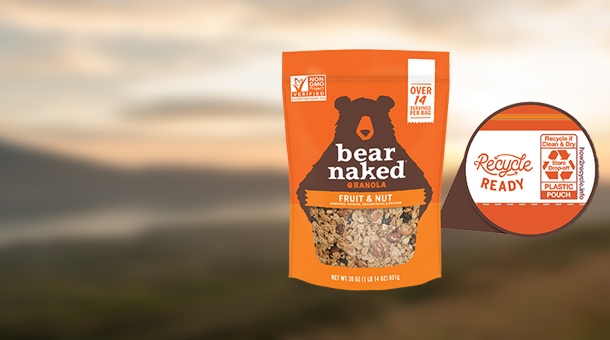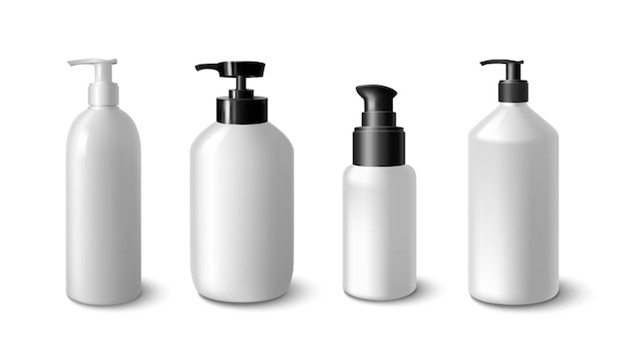
Plastic food packaging adds to this issue; however, it also plays an important role in food quality, safety and reducing food waste. However, this isn’t an either/or proposition – we must ensure that our packaging contributes to the circular economy. Already, Kellogg has one of the smallest plastic packaging footprints among peer food companies2 and 76% of our packaging is recyclable globally. Most of our other packaging uses either recycled-content paperboard cartons or corrugate cardboard. We also use composite cans, and for our bars and convenience foods, we use flexible plastic packaging. We are aggressively driving cutting-edge innovation, looking at how packaging can protect and enhance our foods and have an even smaller environmental impact.
“We’re incredibly motivated to be part of the solution,” said Nigel Hughes, DPhil., senior vice president, research quality, nutrition and technology. “We’re wasting no time in working toward our goal of using 100% reusable, recyclable or compostable packaging by the end of 2025. This goal aligns to the Ellen MacArthur Foundation’s (EMF) New Plastics Economy Global Commitment, which we were among just a handful of food companies to sign on to in 2018.”
Achieving our sustainable packaging goal is part of our global Kellogg’s Better Days® commitment to create Better Days for 3 billion people around the world by 2030 by addressing the interrelated issues of wellbeing, food security and climate resiliency. It also supports United Nations’ Sustainable Development Goal #12 – Sustainable Production and Consumption – including #12.5, to “substantially reduce waste generation through prevention, reduction, recycling and reuse.”
When our founder Mr. Kellogg introduced the first box of Kellogg’s Corn Flakes® cereal in 1906, it came in boxes made from recycled content. Today, 100% of our timber-based packaging that goes into cereal and other boxes comes from low risk, certified-sustainable or recycled sources. And we’re speeding up our efforts to achieve our packaging goal. Around the world, we’re committed to following the principles of the circular economy, excluding, reducing and replacing plastic, as well as building external partnerships to ensure more plastic can be recycled after use. Below are a few examples on how we are progressing against our commitment. More information about our efforts are provided in our Sustainable Packaging Annual Milestones.

Exclude
In 2018, we implemented a “greening” of our facilities, transitioning to compostable and paper foodservice products in all our plants and offices globally … no more plastic and no more single-use foam. In our U.S. operations in Illinois and Michigan alone, we diverted 2 million pieces of silverware, 105,000 straws and 110,000 bottles from landfill every year. We also eliminated single-use plastic spoons that were part of certain packages.
Reduce
In the U.S., we’re reducing the thickness in some of our bag-in-box retail cereal packages by 17% to reduce our plastic packaging by 97,000 kilograms, or the equivalent of nearly 35, 30-gallon barrels of uncrushed plastic bottles each year3. This project will enable us to eliminate the equivalent amount of packaging it takes to produce 9 million bag-in-box liners, annually. We also recently decreased the size of cereal boxes, while maintaining the same amount of food in each box. As a result, we reduced the size of the corrugated shipping cartons that hold these packages, eliminating up to 1 million pounds of packaging material.
We also currently have some instances where we bulk ship cereal in reusable bins from the production facility to the final destination, where it is packed into pouches or bag-in-box packages. This happens with our granolas and cereals in multiple regions. In Africa, India, China and Australia, we’ve significantly reduced packaging using this approach.

Redesign
Today, 76% of our packaging is recyclable. In 2020, Kellogg launched Bear Naked®’s first fully recyclable pouch for granolas in the U.S., making it available for store drop-off at more than 18,000 stores nationwide. In Europe, Kellogg launched a project to move cereal pouches to a recycle-ready material by late 2019, which should remove 480 tonnes of non-recyclable packaging from the supply chain each year. In Mexico, we are piloting a project to replace PET packaging with material that can more easily be crushed into pellets and recycled.
We’ve had similar success in the U.S. redesigning packaging in our MorningStar Farms® veggie foods by moving to resealable bags. We reduced packaging weight by 38%. As an added benefit, the bags help fight freezer burn, which reduces food waste.
Across Europe, we are driving innovation by testing and learning different redesign approaches. In the U.K. and France, we’re testing refillable cereal stations that eliminate packaging with each repurchase. In Italy, we’re testing new Pringles® cans to determine how to best increase the recyclability of this global snack.
As we continue to exclude, reduce and redesign, we’re also encouraging more recycling and partnering on new technologies. For example:
- We’re one of 40-leading companies in The Recycling Partnership that invests in community programs and more broad solutions to increase recycling across the U.S. As a member of its Film and Flexibles Taskforce, we’re working across industries to define, pilot and scale recycling solutions for plastic film, bags and pouches.
- In the U.K., Pringles® launched a partnership with TerraCycle to collect and recycle its cans. And in Malaysia, our local waste collector converts rejected Pringles® cans into corrugated paper.
- In Australia, we include the Redcycle logo on our cereal bags. At the Redcycle website, people can easily find the location of their nearest drop-off location. In 2018, 7.7 tonnes of our packaging made it into Redcycle collection bins. A similar effort is underway in the U.S., where we include the How2Recycle label on most of our packages today and are working toward having it on all packages.
- Kellogg India is piloting an innovative project with waste management company Nepra Environmental Solutions in Pune, Maharashtra. Together, we’re developing a system to collect and dispose of multilayer plastic (MLP) waste. Nepra purchases MLP from the local waste-sorting workers and turns it into fuel for cement kilns.

More than 110 years after the very first box of Kellogg’s® cereal included recycled content, using sustainable packaging remains part of our DNA.
“While we don’t have all the solutions, we’re hard at work testing and learning out loud,” Nigel said. “This means researching, collaborating with partners, and piloting new approaches to keeping our foods safe and fresh while also protecting the planet.”







